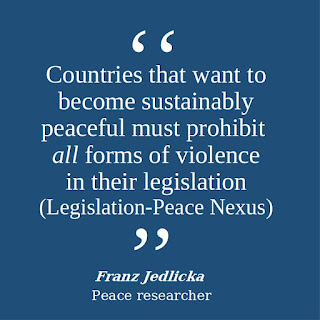by Franz Jedlicka
The Legislation-Peace Nexus - which can also be called the Legislation-Peace Approach - describes the relationship between a country's legislation and its peacefulness. Legislation that prohibits all forms of violence tends to make countries more peaceful, while a lack of such legislation promotes a culture of violence, legitimizes acts of violence, and fosters armed conflict.
The Legislation-Peace Theory emerged from my work on the Culture of Violence Scale, in which I analyzed global data on the legitimacy of different forms of violence in all countries of the world: In its first version (2023) I examined whether in the respective country
- the death penalty is still practiced
- torture is still practiced (the UN Convention against Torture has not been signed or ratified)
- judicial corporal punishment is being practiced
- child corporal punishment is still permitted
- domestic violence against women and marital rape are not prohibited
- the persecution and murder of homosexuals and LGBTIQ+ people is permitted by law
It has been shown that most of the countries in which these forms of violence are still legal perform worse in the Global Peace Index (GPI), while countries in which all of the aforementioned acts are prohibited are mostly at the top of this index (exceptions are, of course, countries that have been attacked - these also perform worse in the GPI, although they are mostly not to blame for the armed conflict in their country).
The best positive example of the Legislation-Peace Nexus are the countries of the European Union: almost all member states have banned all forms of violence by law, thereby conveying to their citizens that violence is never a permissible means of conflict resolution. One can speak of a consistent legislation of non-violence.
From the perspective of peace psychology, a legal ban on child corporal punishment is the most urgent task for countries that want to become more peaceful. The negative effects of adverse childhood experiences have been extensively researched, but it takes several years for a generation raised without violence to grow up and be able to shape the politics of a country with the empathy it has acquired.
However, this does not mean that a ban on other forms of violence is any less important. It will probably be a question of negotiations between political actors as to which legal reforms can be implemented most quickly.
One advantage of this peace strategy is that it corresponds to some Sustainable Development Goals - that all countries in the world have committed to achieving anyway: for example the SDG 16.2 (protect children from violence) and SDG 5.2 (protect women and girls from violence). Therefore there should already be a fundamental interest in these changes in the government of every country, regardless of political differences.
However, legislative changes in the sense of the Legislation-Peace Nexus (for me, by the way, part of a “peace mainstreaming” strategy) are not a short-term peace strategy: the positive effects can usually only unfold after some time. It is also relevant whether legislative changes are accompanied by an information campaign that informs the population in detail that certain forms of violence are now prohibited.
The legal protection of people from physical violence is not the only focus of the Legislation-Peace approach. It is of course also about protecting all citizens from discrimination. If population groups are no longer discriminated against, the “structural violence” (Johan Galtung) in the country in question, which is also the breeding ground for armed conflict, decreases. Gender equalty in particular is an important factor for peace, which has also been scientifically proven several times and was reflected in UNSC Resolution 1325.
Literature and data sources (selection)
Early Childhood Peace Consortium: https://ecdpeace.org
Global Peace Index: https://www.visionofhumanity.org/resources/
GRILLE, Robin (book): Parenting for a peaceful world
HUDSON, Valerie, LEE BOWEN Donna, NIELSEN, Perpetua Lynne (book): The First Political Order. How Sex Shapes Governance and National Security Worldwide
INSPIRE Handbook for better protection of children from violence: https://inspire-strategies.org
JEDLICKA, Franz: Culture of Violence Scale 2023: http://dx.doi.org/10.13140/RG.2.2.22929.81760
LECKMAN, James F., PANTER-BRICK, Catherine, SALAH, Rima (Eds. - Book): Pathways to Peace. The Transformative Power of Children and Families
List of countries that prohibit child corporal punishment: https://endcorporalpunishment.org , https://en.wikipedia.org/wiki/Child_corporal_punishment_laws
List of countries that prohibit violence against women: https://genderdata.worldbank.org/en/indicator/sg-leg-dvaw
Report on the legal situation of LGBTIQ+ people worldwide: https://ilga.org/state-sponsored-homophobia-report/
UNSC (United Nations Security Council) Resolution 1325: https://en.wikipedia.org/wiki/United_Nations_Security_Council_Resolution_1325
Women, Business and the Law Report https://wbl.worldbank.org/en/wbl
Women, Peace and Security Index: https://giwps.georgetown.edu/the-index/
This article is published under the following CC License: https://creativecommons.org/licenses/by-nd/4.0/deed.en which means it can be re-published on other websites or in printed publications (also commercial ones) in an unchanged way naming the author and this website.
You can comment on Franz Jedlicka's articles on LinkedIn and Researchgate.net
